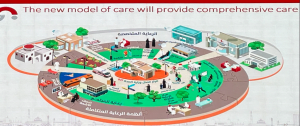Our aim is to develop an Artificial Intelligence (AI)-based algorithm for modeling trauma care delivery in diverse resource and infrastructure settings. To achieve this, we will analyze traumatic injury rates, prehospital care, hospital services, and post-hospital rehabilitation in a high-volume urban US trauma center (Houston, TX) and an academic trauma center in the Middle East (Riyadh, Saudi Arabia). By examining varying complexities and resources within these trauma systems, we will refine our algorithm to model trauma care delivery effectively. Our ultimate goal is to employ machine learning to create a practical, functional trauma system for post-conflict and post-disaster areas in the Middle East. This system will not only be practical in itself but also serve as a dynamic tool, offering a structured approach to gradually scale the system to suit the unique needs of each local area.
The decision to concentrate on post-conflict and post-disaster populations in the Middle East is grounded in personal experiences. Interactions with physicians during the Syrian civil war instilled a profound sense of duty within me to assist through health systems design. My journey commenced with city infrastructure design and refugee repatriation efforts, shedding light on how war-torn infrastructure and economic stagnation perpetuates refugee displacement. This underscored the historically underfunded and overlooked nature of rehabilitation and reconstruction work. Consequently, post-conflict and post-disaster regions became the central focus of my future endeavors.
Our goal, once this model is established, is to leverage this knowledge to develop prototypes of trauma systems tailored to the unique needs of Middle Eastern post-conflict and post-disaster areas. These communities are chosen due to their elevated vulnerability, limited healthcare resources, and pervasive healthcare disparities. By optimizing resource allocation and enhancing trauma care access, our project aims to mitigate trauma-related morbidity and mortality in these regions, ultimately making a profound impact on their healthcare outcomes.
Our research addresses a critical gap in access to trauma care for post-conflict and post-disaster regions by constructing a framework for needs-based trauma systems development. We will begin by studying existing systems in urban underserved areas within the Middle East, starting with Riyadh, Saudi Arabia. Our AI-based model will generate prototypes of trauma systems that will expedite and modernize injury response after conflict or disaster. Our research approach also offers benefits for the existing trauma systems at multiple stages. The comprehensive study of current trauma systems will enable comparison for quality improvement and care optimization in respective communities. The integration of geospatial mapping will serve as a powerful tool for visualizing access and trauma-related disparities for targeted public health interventions. Ultimately, we hope our model will serve as a practical tool for healthcare planners and improve health outcomes for patients.










I was in Riyadh for 2 months on the trauma service and working to blueprint their existing system. The first month was mostly clinical - working with the trauma attendings, residents, and fellows. I learned the flow of trauma care by being a part of the team including rounds, OR time, and resident education. Alongside the clinical immersion, my research focused on establishing a database that is able to blueprint the continuum of trauma care in the level 1 trauma center I was working at. We partnered with the Saudi Red Crescent (primary EMS provider) to overview all the trauma activations in the city, transport time to the hospitals, and any regional delays. We identified lack of protocols for transfer which delayed care. This was brought to the attention of Red Crescent team who took immediate action to implement stricter triaging protocols. Our study also focused on hospital and post-hospital resource variability which will be published.
My time in Saudi Arabia was enlightening on many fronts. It was my first time visiting and had few expectations. The welcoming community there took me by surprise and it felt like home in the first few days of being there. Clinical volume there is pretty high so hours were long, but the team's commitment to each other and the patients was truly remarkable. Our research efforts there strengthened the research infrastructure in the hospital as no prior prospective work had been done. Much of the analysis was entirely learned by the medical students there and has created infrastructural strength for future similar efforts.